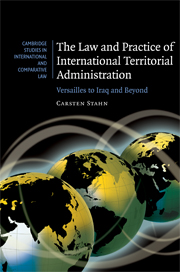Book contents
- Frontmatter
- Contents
- Foreword
- Preface
- Selected table of cases
- List of abbreviations
- Table of engagements
- Introduction
- Part I The historical and social context of international territorial administration
- Part II The practice of international territorial administration: a retrospective
- Introduction
- 6 International territorial administration as a means of dispute settlement - the post-war experiments of the League of Nations and the United Nations
- 7 From the post-war period to the end of the Cold War: the use of international territorial administration as an ad hoc device
- 8 The systematisation of international governance
- 9 The “light footprint” and beyond
- 10 A conceptualisation of the practice
- Part III The foundations of international territorial administration
- Part IV A typology of legal problems arising within the context of international territorial administration
- Part V International territorial administration at the verge of the twenty-first century: achievements, challenges and lessons learned
- Bibliography
- Index
- CAMBRIDGE STUDIES IN INTERNATIONAL AND COMPARATIVE LAW
7 - From the post-war period to the end of the Cold War: the use of international territorial administration as an ad hoc device
Published online by Cambridge University Press: 19 January 2010
- Frontmatter
- Contents
- Foreword
- Preface
- Selected table of cases
- List of abbreviations
- Table of engagements
- Introduction
- Part I The historical and social context of international territorial administration
- Part II The practice of international territorial administration: a retrospective
- Introduction
- 6 International territorial administration as a means of dispute settlement - the post-war experiments of the League of Nations and the United Nations
- 7 From the post-war period to the end of the Cold War: the use of international territorial administration as an ad hoc device
- 8 The systematisation of international governance
- 9 The “light footprint” and beyond
- 10 A conceptualisation of the practice
- Part III The foundations of international territorial administration
- Part IV A typology of legal problems arising within the context of international territorial administration
- Part V International territorial administration at the verge of the twenty-first century: achievements, challenges and lessons learned
- Bibliography
- Index
- CAMBRIDGE STUDIES IN INTERNATIONAL AND COMPARATIVE LAW
Summary
Following the non-realisation of the proposed internationalisations of Jerusalem and Trieste, the practice of the UN in the area of international territorial administration changed. The UN refrained from undertaking or designing large-scale and long-term projects of neutralisation à la Saar or Danzig. Instead, it adopted a rather pragmatic stance on the exercise of functions of governance and administration outside the context of the Trusteeship System. The organisation assumed tasks of direct territorial administration in the fields of decolonisation and conflict management in situations where a need for multilateral solutions arose. Yet, the UN was neither systematic nor organised along the lines of a coherent institutional model. International territorial administration was mainly used as an ad hoc device, deployed and adjusted to meet the needs of the specific situation in which it was practised. This pragmatic approach gave rise to a variety of different forms of engagement, involving many of the Charter's main organs (the Security Council, the General Assembly, the Secretary-General) in distinct capacities.
At the same time, the UN learned some lessons from the previous undertakings in territorial administration. Deviating from the experiences in the cases of Trieste and Jerusalem, the organisation based its engagements, as far as possible, on the consent of local actors involved. Non-consensual undertakings remained the exception, and occurred mostly by accident in situations in which domestic authorities lost control over their territory. Furthermore, UN practice departed from the tradition of conceiving international authority as a permanent model of dispute settlement.
- Type
- Chapter
- Information
- The Law and Practice of International Territorial AdministrationVersailles to Iraq and Beyond, pp. 207 - 265Publisher: Cambridge University PressPrint publication year: 2008



